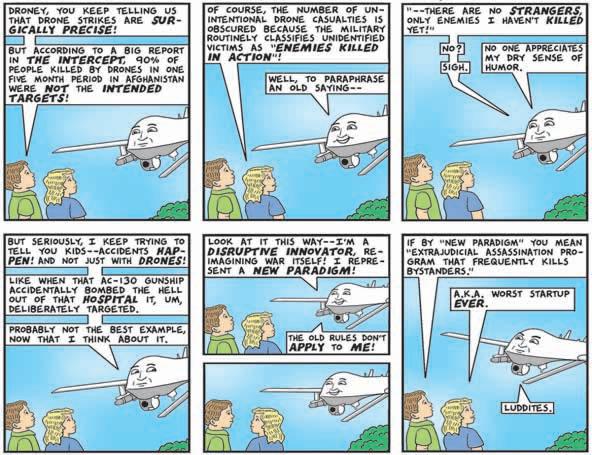
4 minute read
Opinion/Streetalk
from Oct. 22, 2015
ThIS ModeRn WoRld by tom tomorrow
Asked at Michael’s Deli, 628 S. Virginia St.
Advertisement
James Moffatt
Mechanic I don’t watch the news. I don’t like the bias factor of mainstream media. Heavy bias toward a viewer base is to be expected, but I appreciate completely unbiased information, so I try to get news straight from the source’s firsthand accounts rather than articles or secondhand stories like you get from mainstream media outlets.
Bob Howell
Retiree I like to listen to national news. I don’t like listening to biased opinions, like if people cover Trump. He just likes to see his name in the papers, and if he’s the frontrunner for Republicans, they’re in trouble. The news stations that I like most are the Public Broadcasting System.
Curb our garrison state What do you think of news coverage?
President Kennedy, June 10, 1963: “What kind of a peace do I mean and what kind of a peace do we seek? Not a Pax Americana enforced on the world by American weapons of war.”
The Democratic debate in Las Vegas was heartening after the earlier Republican debates. The civility, restraint and intelligence was a relief after weeks of bluster, recklessness and juvenile inanity among GOP candidates. It was, as a New York Times editorial put it, a case of the grownups taking the stage.
It was also educational, when the moderator got out of the way and let the candidates discuss issues. The two leading candidates called for major programs to build up quality of life in the United States. Sen. Bernie Sanders in particular tried to drive the debate to what government will do to serve the public, as with his proposal for free college for all. Hillary Clinton spoke of bringing health care to every child. All the candidates assigned a high priority to combating climate change.
There is a problem with these laudable goals. While— thanks in large part to Sen. Sanders—all the candidates are on record to change the tax system so those at the top pay more, that doesn’t get the nation all the way to paying for the programs the candidates champion. The United States is carrying an oppressive, taxing, worldwide load of military spending that will not permit it.
In a world with fewer than 200 countries, the U.S. is believed—the Pentagon is less than candid about this—to have between 700 and 800 military bases in more than 60 countries occupying something like 30 million acres. The U.S. government is involved in wars that are essentially unknown to the public, sometimes hidden in plain sight. No one knows how many. Here are estimates by various entities: Mint Press News: 139. Ron Paul Institute: 14. The Nation magazine: 135. Foreign Policy magazine: 4. Salon: 120. You see the problem.
It has come to this. We don’t know how many wars our government is fighting, and our government isn’t telling. Samples:
After September 11, under the ever-handy guise of counterterrorism, George W. Bush foolishly sent troops to the Philippines. They are still there—600 of them, Army, Navy and Air Force—dealing with longstanding internal problems of the Philippine government. Nevadan Kelly Firth tragically died there.
The U.S. is paying the cost of wars in Mali and the Central African Republic fought by France and its allied former colonies, which President Obama and French President Francois Holland have called a way to “dialogue, reconciliation and swift progress” in the name, again, of counterterrorism. Critics say there is no end in sight to the ever-expanding mission. It is reminiscent of the 1946-1954 war by France and its colonies in Indochina for which the United States picked up the tab—and then the war. Mother Jones reports the U.S. is involved in conflicts in 49 or 54 African nations, and that massive commitment is hardly winning friends, but it is eating up hundreds of millions and putting our troops in harm’s way nearly everywhere.
There is a world’s police officer, little known to the public, called the U.S. Special Operations Command, that wanders the world fighting wars or training others to do it, without permission from Congress for warmaking.
Then, of course, there are Iraq and Afghanistan, and innumerable military bases across the U.S.
On and on it goes. This is offense, not defense.
It cannot go on, and the Democrats are complicit. Their Pax Americana must end if their optimistic plans are to have any hope. Ω Cannon Campbell
Student There’s a lot of information. I usually read the paper because I like actually reading things. I like a piece of paper in my hands. I don’t like looking at my phone.
Mike Tarpey
Contractor There’s too much of it. You know, all the social media that we have nowadays, it’s almost like you have nothing but inundation of information. And a lot of it is so negative based that it seems like it’s produced by fear merchants. So I like not to partake of a lot of that. I’m trying to live my life in a positive manner.
Scott McMasters
Information technology consultant I think it’s pretty good. I do a little bit of each [print and broadcast] but mainly, probably, television.










